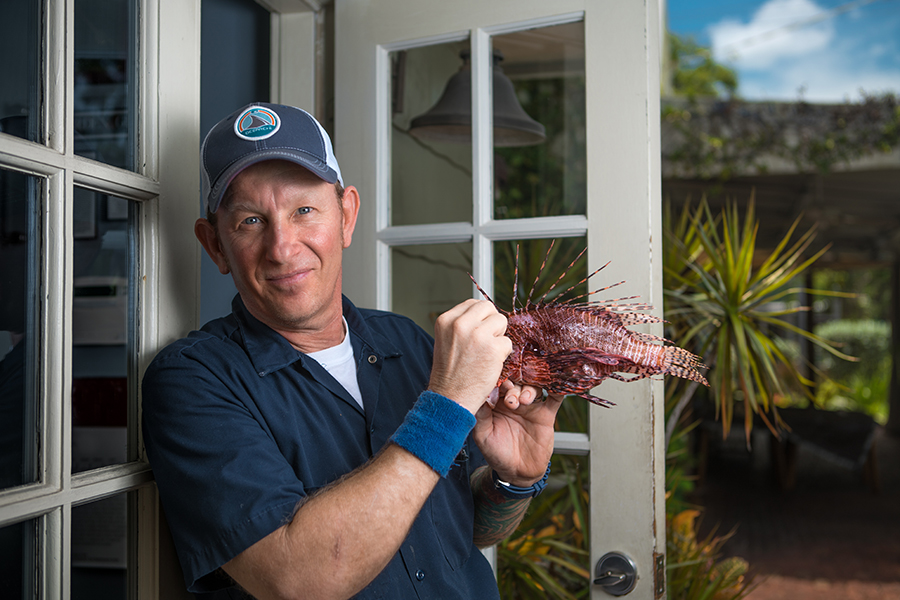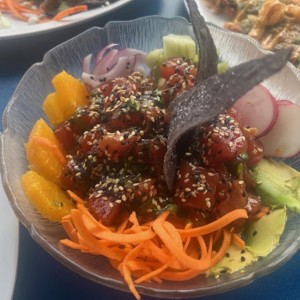More than a restaurant, chef Steve Phelps describes indigenous as a schoolhouse. “Here you’ll get an education, the story why we’re cooking what we’re cooking—it’s not just a meal,” he says. He gets his culinary inspiration from a thought or a world event, paying attention to everything. He mentions an award-winning Japanese street food pancake he experienced, afterward researching, studying and executing. The result: a newly crafted menu with these influences. Lebanese stewed green beans were part of the menu in the recent past; the dish floored a recent restaurant patron, who said it was made just as her family used to prepare them. At Indigenous, the menu continues to introduce diners to foods they may have never had before, or in this case, transport them to their past.
Situated on a corner in the Towles Court neighborhood, you could easily mistake the restaurant for a house—one where you’d actually want to live. It’s a bungalow-style building with a well-thought-out patio area with abundant plant life, draping cream-colored curtains and dimly lit sconces setting an inviting scene. Inside, rustic-chic tables are made from reclaimed cypress wood, with similarly wooded floors and smaller separate dining rooms making for a cozy and warm atmosphere. There’s an eclectic mix of music piping throughout the restaurant—reggae fusion, Gary Clark Jr., Mazzy Star—set at an appropriate volume to allow for conversation. It feels like you are in the home of a hospitable friend. The restaurant closes each year for two weeks, when the staff travels, gets inspiration and studies to prepare for the reopen. During this time, management also paints the walls of a dining room that sits to the right of the entrance a different color each year. Along with some new menu items, you’ll feel the environment change, even if you can’t put your finger on it.
“It’s all about the food, the people, music, spirits and passion about what we do,” says Phelps. A true pioneer, he is the recipient of two James Beard Awards, Best Chef: South 2014 and 2015, mentioning that the recognition was good for the food scene in the entire city. He doesn’t brag, but rather says it served as a benchmark for others to step up their game and pay attention to what is being served.
“Farm to fork shouldn’t be a discussion, it should just be the norm,” Phelps says, expressing seriousness and passion. In his opinion, people care more today about their food—where it’s coming from and the humane treatment of the animals. He works closely with Niman Ranch, an all-natural meat purveyor committed to humane animal care and practices, as well as local fish supplier Healthy Earth Sarasota and sources aquaponic fish from Mote Aquaculture Park.
“We have such a good source of seafood that’s neglected,” Phelps says, siting nearby Anna Maria Island and Cortez, communities that became what they are today because of fishing. Oftentimes, restaurants now move away from local fish to bring in mainstream nonlocal varieties such as salmon, tuna and mussels to appeal to vacationers, dictating menus to suit what the guests are familiar with eating.
In an attempt to bring locally sourced ingredients back to the table, Phelps is passionate about taking care of the ocean and being mindful of the fisherman and their families, taking into consideration how serving locally caught fish supports them. One such local, scarcely heard of fish in Phelps’ repertoire is the lionfish—often referred to as “the enemy,” the lionfish is an invasive species threatening local marine life and coastal ecosystems. Ironically, yet equally as wonderful, it is lovely to eat, mild and delicate with a bit of sweetness to it, like that of Gulf shrimp or lobster.
With an eye toward ecosystem conservation, Phelps supports organizations such as the Mote Marine Laboratory and Aquarium, where Black Opal Caviar—currently showing up on several local menus—is being grown at a sustainable aquaculture farm. You may also find bottarga (grey striped mullet roe) on the Indigenous menu, sourced from the nearby fishing village of Cortez, an area producing some of the highest-quality grey mullet, and in turn its golden roe, in the world.
Back on that beautifully set terrace, an often found plate of Two Docks pickled clams (from Bradenton) is accompanied by Key West baby shrimp, Black Opal caviar (from Mote), smoked fish custard and basil purée. Another tempting dish is found in the wild-caught Gulf shrimp prepared with that street food-inspired Japanese pancake called okonomiyaki. And of course, there’s the lionfish, prepared as a tartare with ginger, fried quinoa, cilantro crème fraîche and Mote sea beans. The diversity of the flavors merge together perfectly, the delicate fish melting like butter in the mouth coupled with a balmy breeze, sounds of ‘60s soul and seamless service make for a remarkable evening—one that will make you want to go back for seconds.
Indigenous, 239 South Links Ave., Sarasota, 941-706-4740.











